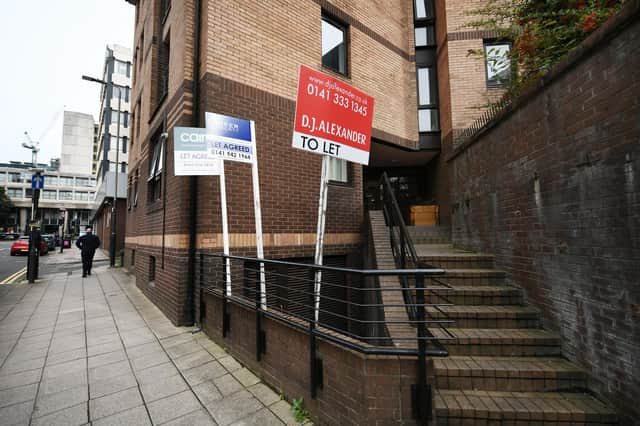Tailored eviction policy better than a blanket ban - David Alexander comment


While consultation on the issue is still in progress and there is, as yet, no scheduled date for a vote in Parliament, First Minister Nicola Sturgeon has expressed support for an extension of the ban which, if implemented, would mean it had lasted for almost 12 months.
My sympathy is based on the fact that, when eventually reinstated, evictions will inevitably apply to some otherwise model tenants who are losing their homes through no fault of their own; in other words, people who already have, or will in the near future, be out of a job as a result of the economic fallout of Covid-19.
Advertisement
Hide AdAdvertisement
Hide AdIt is for this reason that our agency (and, I am sure, many other bona fide ones too) has spent countless hours of negotiation involving tenants and landlords that have come up with individual rental payment plans to enable occupiers worst-affected by unemployment – or fear of unemployment – to keep a roof over their heads.
And, as this column stated last month, most landlords looked at the “bigger picture” and have responded by agreeing to generous discounts and delayed (or even cancelled) payments, inevitably at cost to their own finances. Those landlords also took the view that, as with any speculative investment, property can be subject to be bumps along the way.
They were attracted to buy to let because this sector offered much higher returns than conventional savings but without the volatility of the stockmarket. However, most realised that property was not risk-free, although I’m sure they were of the opinion that any potentially serious loss would involve a crash in capital values rather than rental income, as has happened as a result of Covid-19.
Up to now, the majority of landlords have had a pretty good run of the ball, in terms of capital growth and annual returns in the form of net rental income. And with property values holding up remarkably well, they are in a much better position than shareholders heavily invested in companies that have tanked or crashed altogether.
Options
So, yes, part of me agrees that extending the ban on evictions until March is a good thing. Conversely, my “other self” tells me landlords cannot be expected to accept a situation whereby lower-than-agreed rents become the norm for an indefinite period. Even if tenants are in arrears through no fault of their own, landlords must have the ultimate option to evict, although I would prefer to use the word “repossess”, which not only sounds less harsh but is more accurate.
For this reason, rather than extend a blanket ban on evictions/repossessions, cases should be individually tailored, with the current legal parameters extended to take account of the effect of Covid-19 on each tenant in terms of ability to meet rental commitments not only now but into the future.
Although most people appear to be exceedingly honest about their financial situation when making a claim for a rent reduction or “holiday”, a few have tried to exploit the situation, which is unfair not just on landlords but on the majority of tenants who play by the rules.
And, let’s be honest, the basic eviction law should still apply to the type of tenant who – long before the virus ever hit this country – stopped paying rent for no good reason, caused damage to the property, or subjected neighbours to anti-social behaviour (the three often go together).
Advertisement
Hide AdAdvertisement
Hide AdFinally, the best way to minimise evictions/repossessions is for the Scottish Government to put more effort into making provision for a re-start of the economy so that as many tenants as possible retain an income sufficient to pay their rent.
I realise ministers have faced an unprecedented dilemma that few people – even six months ago – could have predicted, but perhaps they should be more mindful that a huge economic slump is likely to be as much a danger to public health as Covid-19.
David Alexander is MD of DJ Alexander
A message from the Editor:
Thank you for reading this story on our website. While I have your attention, I also have an important request to make of you.
The dramatic events of 2020 are having a major impact on many of our advertisers - and consequently the revenue we receive. We are now more reliant than ever on you taking out a digital subscription to support our journalism.
Subscribe to scotsman.com and enjoy unlimited access to Scottish news and information online and on our app. Visit https://www.scotsman.com/subscriptions now to sign up. By supporting us, we are able to support you in providing trusted, fact-checked content for this website.
Joy Yates
Editorial Director
Comments
Want to join the conversation? Please or to comment on this article.